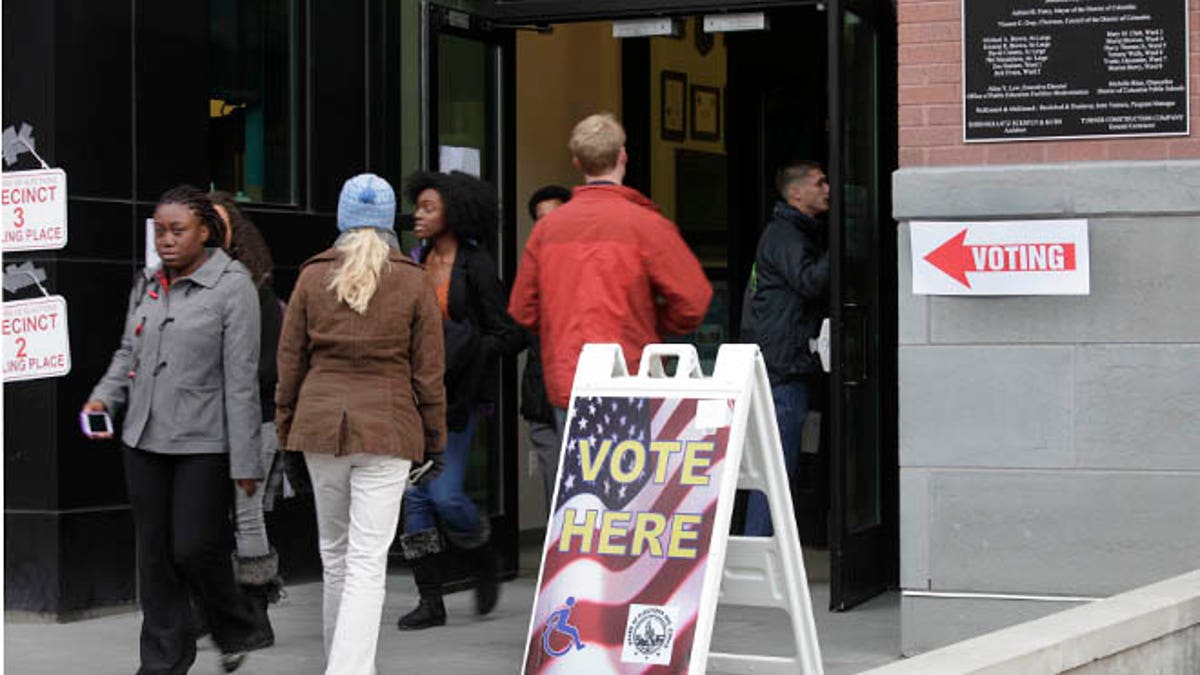
FILE: Nov. 6, 2012: Voters cast ballots during the U.S. presidential election at the School Without Walls polling station in Washington, D.C. (REUTERS)
After years of getting out-maneuvered by the Obama campaign's highly touted voter-contact operation, Republicans say they have an unprecedented operation of their own -- a combination of superior data-collection and field operations capable of contacting the straggling, undecided voters in a race's final hours.
"The Republican National Committee has never been in a better place to help candidates and give them a better ability to win," said Sean Spicer, RNC communications director.
Spicer and his team told reporters their operation, with help from Silicon Valley, features continuously updated voter information at the "granular" level that is gleaned from everything from hunting permits to snowmobile licenses.
They also described a "real-time" scenario -- implemented in the special Florida election last month -- in which campaigners equipped with smartphones and an app punch up a voter list, knock on a door, talk to a prospective voter, then move on as the app automatically uploads the responses to a central database.
RNC officials call this interaction "dynamic scripting" and explain that canvassers will tailor their pitch to each individual voter, based on each response. For example, a prospective voter's response on immigration might prompt a campaign to return to reinforce its candidate's stance on the issue.
"You don't get that by going through a call list," RNC Chief of Staff Mike Shields said. "And [Florida] wasn't just a test. It was live fire."
That baptism by fire was the race in which Republican David Jolly defeated Democrat Alex Sink for an open House seat in Florida.
"This was us beating them at their own game," Shields said. "It's not to say this is how we won. But it certainly played a huge role. ... The biggest problem we have now is getting [smartphone] chargers to people in the field."
RNC officials -- who at their spring retreat this week in Tennessee will highlight their field, data and digital efforts -- argue their group's voter-database has always been "robust" but now is the most comprehensive in group history.
However, they acknowledge criticism about needing to do a better job of sharing that data with candidates. And they concede that Obama campaign officials did a superior job of touting their operation to the national media.
Sasha Issenberg, author of the 2012 book "The Victory Lab: The Secret Science of Winning Campaigns," told FoxNews.com the idea of dynamic scripting is nothing new because phone bank operations have been doing something similar for years -- issuing paper scripts that, for example, tell callers to offer an absentee ballot when prospective voters say they cannot go to a polling station.
However, he said that putting the operation on an app appears "potentially novel," though "not conceptually more sophisticated than what campaigns did on a clipboard 10 years ago."
"There are a lot more tools that everybody in politics now has," he continued. "Campaigns spend so much time and money. So anything that can help you become just 5 percent more efficient is worth it."
He made the case that "coding" that automatically sends the voter responses to a central databank is measurably useful to volunteers who knock on 100,000 doors -- because time not spent sending the information means perhaps 1,000 more voter contacts.
To be sure, much is at stake for Republicans this cycle, particularly the chance to win control of the Senate and perhaps take that momentum into 2016 when voters will elect a new president.
The RNC said its revamp operation will cost roughly $57 million, including $17 million for the digital side.
The rest of the money is going to an expanded ground game that already includes 193 field staffers in targeted voter precincts across 22 key states.
The RNC also has 14,000 precinct captains and plans to more than double that number as the primaries conclude and the general election gets into full swing.
"They're trying to reverse engineer what we did two years ago (and cannot) let alone what we're doing this year," said Democratic National Committee spokesman Michael Czin.
Spicer acknowledges that having to pay nearly 200 field staffers, including some in place since June 2013, is expensive and unconventional.
And as an advance warning to supporters and critics alike, he says the RNC's $10 million cash on hand right now "might be the high-water mark" of the election cycle.
Shields also acknowledges that having to make a monthly payroll is a risk and a departure from the conventional strategy of hoarding cash until the closing weeks of a race, then blowing it on TV and radio advertising.
"This is why people don't do this," he said. "It's hard, but the donors are buying into it."




